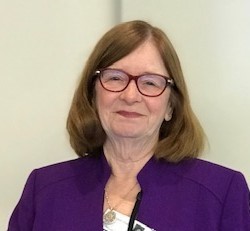
![]()
AHRQ Grantee Profile on Barbara Yawn, M.D., M.Sc., Highlights Work in Women’s Health

Barbara Yawn, M.D., M.Sc.
Barbara Yawn, M.D., M.Sc.
Adjunct Professor, Department of Family and Community Health
University of Minnesota
When Barbara Yawn, M.D., M.Sc., began her primary care research in 2000, the field was still in its infancy and there weren’t many research studies about the needs of special populations. As a primary care physician in a rural community, Dr. Yawn helped to close this knowledge gap by studying treatments for conditions affecting her patients in overlooked groups, specifically women and rural residents.
With funding from AHRQ, Dr. Yawn, now an adjunct professor in the Department of Family and Community Health at the University of Minnesota in Minneapolis, researched best practices for diagnosing and treating chronic conditions in special populations in rural communities, including coronary heart disease (CHD), postpartum depression, and asthma. Through her efforts, she was able to provide primary care clinicians with resources and techniques to tailor care delivery for women and rural residents, improving patient outcomes.
CHD is the leading cause of death for women in the United States. It is a chronic disease that often develops years before a heart attack occurs. Dr. Yawn received her first AHRQ grant in 2000 to study how primary care physicians diagnosed CHD in women versus men. The project, which focused on rural residents of Olmsted County, Minnesota, compared recorded CHD-related symptoms and timing of the CHD diagnosis in women and men during the 10 years prior to their first heart attack. She found that women were diagnosed much later than men and, therefore, had less time for prevention; women’s CHD symptoms were more likely to be diagnosed as anxiety; and women were less likely to be screened for CHD (for example, through lipids testing) than men. These results helped to fill important knowledge gaps regarding gender differences in the recognition and evaluation of CHD.
In 2003, Dr. Yawn received additional AHRQ funding to modify and validate an asthma assessment tool developed specifically for primary care in 24 rural primary care practices. According to Dr. Yawn, “Implementation of asthma guidelines was challenging, and the burden of the condition remained high.” Her Asthma APGAR (Activities, Persistent symptoms, triGgers, Asthma medications, Response to therapy) tool helped to move research about asthma care into practice by providing targeted feedback to physicians and practices to guide asthma treatment. Unlike previous assessment instruments that provided only a score for the patient’s level of asthma control, Dr. Yawn’s tool also identified potential reasons for poor asthma control, such as exposure to certain triggers, and importantly, linked to a care algorithm to suggest next steps in care. The study found that the tool had a positive impact on asthma care and patient satisfaction with their asthma care, and it served as a foundation for Dr. Yawn’s future work on asthma management.
Dr. Yawn undertook another AHRQ grant in 2005 to test the impact of a screening and follow-up program for postpartum depression (PPD) versus the usual care in family physicians’ offices. According to Dr. Yawn, “AHRQ was one of the few agencies that believed in funding the ‘follow-up’ aspect of this study, as most studies at the time just focused on screening.” She notes that this was critical and said, “You can’t just recommend universal screening. You have to be able to monitor and record the impact of interventions on outcomes.” The project focused on postpartum primary care patients from 46 States with diverse ethnic, geographic, and economic backgrounds. Among the 654 women with elevated PPD screening scores, the study found that those in the intervention practices were more likely to receive a diagnosis of and therapy for PPD, and they also had lower depressive symptom levels at 6 and 12 months postpartum.
A fourth grant in 2010 allowed Dr. Yawn to continue to research her Asthma APGAR tool. While her original project demonstrated the tool’s ability to guide asthma treatment, the follow-up study assessed the tool’s impact on patient outcomes and practice efficiency. Dr. Yawn’s team found that primary care physicians who used the tool were able to lower the rate of emergency room visits by 50 percent and increase the number of patients whose asthma was in control. The use of these tools now is more common due to the efforts of Dr. Yawn and other clinical care researchers to disseminate findings on best practices in asthma care.
Dr. Yawn is a member of the Academy of Family Physicians, the American Thoracic Society, and the International Primary Care Research Group.
Related AHRQ Resources
Principal Investigator: Barbara Yawn, M.D., M.Sc.
Institution: Olmsted Medical Center, Rochester, MN, when receiving grants; Currently, adjunct faculty, University of Minnesota, Minneapolis, MN
Grantee Since: 2000
Type of Grant: Various
Consistent with its mission, AHRQ provides a broad range of extramural research grants and contracts, research training, conference grants, and intramural research activities. AHRQ is committed to fostering the next generation of health services researchers who can focus on some of the most important challenges facing our Nation’s health care system.
To learn more about AHRQ’s Research Education and Training Programs, please visit https://www.ahrq.gov/training.
Internet Citation: Improving Primary Care Delivery for Women and Rural Communities. Content last reviewed May 2022. Agency for Healthcare Research and Quality, Rockville, MD.
https://www.ahrq.gov/funding/grantee-profiles/grtprofile-yawn.html